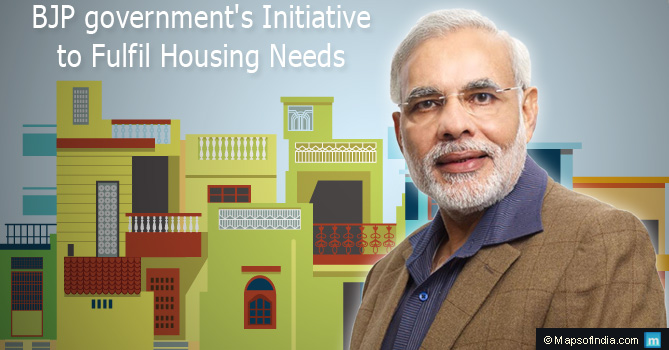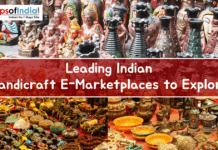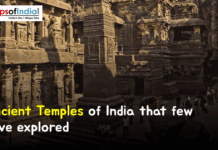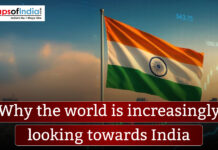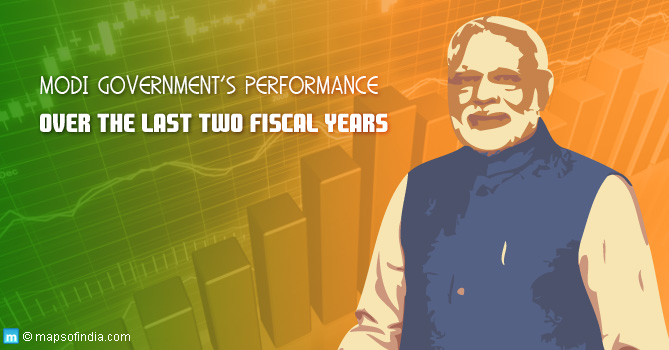Pradhan Mantri Awas Yojana (PM Awas Yoajana) is a government home loan scheme that was launched in June 2015 with the aim of providing affordable homes. It aims to provide more than 2 crore affordable houses with water connection, toilet facilities and 24-hour power supply to eligible families/beneficiaries by 2022.
Pradhan Mantri Awas Yojana
According to current estimates, the urban population of the country, which has already seen a sharp increase over the past decade, is set to see a phenomenal growth in the years to come. By the year 2050, the country’s urban population is set to reach a population of more than 814 million people. This is an increase of about 400 million from current levels. One of the biggest challenges faced by the country will be providing affordable housing, sanitation and development, and a safe environment to the city dwellers. Currently, the development of a city is led by the real estate developers who decide the areas which shall be developed. Real estate prices have also skyrocketed over the past couple of decades leaving the common man with only dreams of owning a house. It is to address these issues that Prime Minister Narendra Modi launched the Housing for All by 2022 scheme, also known as the Pradhan Mantri Awas Yojana (PMAY) on 25 June 2015 at a launch ceremony in Vigyan Bhawan, New Delhi. Two other schemes were also launched as complementary to the affordable housing scheme, a scheme for development of Smart Cities across the country and the Atal Mission for Rejuvenation and Urban Transformation (AMRUT) that allows for urban renewal and upgradation of infrastructure in the major urban tracts of the country.
The Prime Minister of India launched the PMAY and the two other schemes in the presence of mayors, municipal commissioners, and state-government officials from all parts of the country. At the launch he said, “The country’s 40 per cent population lives in cities and it is the responsibility of the government to uplift their standards of living. We cannot leave them to their fate…The housing for all scheme will ensure every urban poor is enabled to own a house. AMRUT will ensure basic infrastructure and sanitation is in place in cities.”
Scheme Details
According to the terms of the Pradhan Mantri Awas Yojana, the government of India will undertake to construct about two crore houses by the year 2022. Each house provided under the scheme will involve a central grant of about INR 1 lakh which may go up to INR 2.3 lakhs. This will come as part of a 6.5 percent interest rate subsidy scheme (previous schemes had an interest rate subsidy of about 1 percent). This means that the applicants from lower income groups who avail of the housing scheme may apply for a housing loan with interest subsidy of 6.5 percent. The tenure or term for these housing loans may go up to 15 years and the total benefit received by such loan subsidy will add up to INR 1 to 2.3 lakh each. Currently housing loan interest rates are estimated at about 10.5 percent. The subsidy should, therefore be a major relief to applicants. The ‘Housing for All’ scheme will replace all previous government housing schemes such as the Rajiv Awas Yojana.
According to preliminary estimates, the Housing for All by 2022 will cost the central government about INR three lakh crore spread over the next seven years. The operational guidelines for the schemes launched have been finalised after a year-long round of negotiations with states and Union Territories, say news reports.
Apart from the PMAY itself, the government has come up with a number of incentives and subsidies for the development of housing in urban areas. One of these is the grant of INR 1 lakh per beneficiary to state governments for the development of housing projects in slum areas.
Affordable rental housing, an INR 6,000 crore initiative, which was initially to be part of the Housing For All scheme was missing from the NDA government flagship scheme. The measure, meant to combat the proliferation of slums in urban regions may be released as a separate scheme at a later date.
Coverage and Duration of Pradhan Mantri Awas Yojana (PMAY) :
Phase I (April 2015 – March 2017): This phase will cover 100 cities selected from States/UTs.
Phase II (April 2017 – March 2019): Second phase of PMAY will cover additional 200 cities.
Phase III (April 2019 – March 2022): Third and last phase will cover all other remaining cities.
List of Cities Selected for Pradhan Mantri Awas Yojana
| State | City |
|---|---|
| Andhra Pradesh | Adoni, Amaravati Capital City, Anantapur, Bhimavaram, Chilakaluripet, Chirala, Chittoor, Dharmavaram, Eluru, Gudivada, Gudur, Guntakal, Guntur, GVMC, Hindupur, Kadapa, Kadiri, Kakinada, Kavali, Kurnool, Machilipatnam, Madanapalle, Mangalagiri, Nandyal, Narasaraopet, Nellore, Ongole, Palacole, Proddatur, Rajahmundry, Rayachoti, Srikakulam, Srikalahasti, Tadepalligudem, Tadpatri, Tenali, Tirupati, Vijayawada, Vizianagaram, Yemmiganur |
| Chhattisgarh | Ahiwara, Ambikapur, Bade Bacheli, Bagbahara, Baikunthpur, Balod, Baloda Bazar, Bhatapara, BhilaiCharoda, Bhilai Nagar, Bijapur, Bilaspur, Birgaon, Champa, Chirmiri, Dantewada, Dhamtari, Durg, Gobra Nawapara, Jagdalpur, Jashpur Nagar, Kanker, Kawardha, Kondagaon, Korba, Mahasamund, Mana-Camp, Manendragarh, Mungeli, Naila-Janjgir, Narayanpur, Pendra, Raigarh, Raipur, Rajnandgaon, Sukma |
| Gujarat | Ahmedabad, Amreli, Anand, Anklesvar, Bharuch, Bhavnagar, Bhuj, Deesa, Gandhidham, Gandhinagar, Himatnagar, Jetpur, Kadi, Kalol, Mahesana, Morbi, Navsari, Palanpur, Patan, Rajkot, Savarkundla, Sidhpur, Surat, Una, Unjha, Vadodara, Vallabh Vidyanagar, Valsad, Vapi, Visnagar |
| Haryana | Faridabad, Gurgaon, Hisar, Karnal, Panipat, Rohtak, Sirsa, Sonipat, Yamunanagar |
| Himachal Pradesh | Baddi, Bilaspur, Chamba, Dharmsala, Hamirpur, Kullu, Mandi, Nahan, Nalagarh, Parwanoo, Shimla, Solan, Una |
| Jammu & Kashmir | Anantnag, Badgam, Baramula, Bashohli, Bhaderwah, Bijbehara, Doda, Ganderbal, Handwara, Jammu, Kargil, Kathua, Kishtwar, Kupwara, LehLadakh, Pulwama, Punch, R.S. Pora, Rajauri, Ramban, Samba, Shupiyan, Sopore, Srinagar, Udhampur |
| Jharkhand | Bokaro Steel City, Chas, Chirkunda, Deogarh, Dhanbad, Dumka, Giridih, Gumla, Hazaribag, Jamshedpur, Lorahdaga, Medininagar, Phusro, Ramgarh Cantonment, Ranchi |
| Kerala | Alappuzha, Kalpetta, Kannur, Kasaragod, Kochi, Kollam, Kottayam, Kozhikode, Malappuram, Palakkad, Pathanamthitta, Thiruvananthpuram, Thodupuzha, Thrissur |
| Madhya Pradesh | Agar, Alirajpur, Anuppur, Ashoknagar, Ashta, Balaghat, Barwani, Berasia, Betul, Bhind, Bhopal, Bina-Etawa, Budni, Burhanpur, Chandla, Chhatarpur, Chhindwara, Dabra, Damoh, Datia, Dewas, Dhar, Dindori, Ganj Basauda, Guna, Gwalior, Harda, Hoshangabad, Indore, Itarsi, Jabalpur, Jhabua, Khajuraho, Khandwa, Khargone, Khurai, Maihar, Manawar, Mandla, Mandsaur, Morena, Murwara (Katni), Nagda, Narsimhapur, Nasrullaganj, Neemuch, Panna, Patharia, Pithampur, Raisen, Rajgarh, Rampur Baghelan, Ratlam, Rehti, Rewa, Sagar, Sarni, Satna, Sehore, Sendhwa, Seoni, Shahdol, Shahganj, Shajapur, Sheopur, Shivpuri, Sidhi, Sihora, Singrauli, Sonkatch, Tikamgarh, Ujjain, Umaria, Vidisha |
| Manipur | Andro, Bishnupur, Heirok, Imphal, Jiribam, Kakching, Kakching Khunou, Kumbi, Kwakta, Lamlai, Lamsang, Lilong (Imphal West), Lilong (Thoubal), Mayang Imphal, Moirang, Moreh, Nambol, Ningthoukhong, Oinam, Samurou NP, Sekmai Bazar, Sikhong Sekmai, Sugnu, Thongkhong Laxmi Bazar, Thoubal, Wangjing, Wangoi, Yairipok |
| Nagaland | Changtongya, Chumukedima, Dimapur, Kiphire, Kohima, Longleng, Medziphema, Mokokchung, Mon, Naginimora, Peren, Pfutsero, Phek, Tseminyu, Tuensang, Tuli, Wokha, Zunheboto |
| Odisha | Anandpur, Athagad, Balangir, Baleshwar, Banapur, Banki, Bargarh, Baripada, Bhadrak, Bhawanipatna, Bhubaneswar, Biramitrapur, Brahmapur, Brajarajnagar, Byasanagar, Choudwar, Cuttack, Debagarh, Dhenkanal, Jagatsinghapur, Jajapur, Jeypur, Jharsuguda, Kantabanji, Khariar, Khordha, Kochinda, Konark, Koraput, Malkangiri, Nayagarh, Paradip, Puri, Rairangpur, Rajagangapur, Raurkela, Rayagada, Sambalpur, Sundargarh, Talcher, Titlagarh, Umarkote |
| West Bengal | Alipurduar, Arambag, Asansol, Ashokenagar Kalyangarh, Baduria, Baidyabati, Balurghat, Bankura, Bansberia, Baranagar, Barasat, Barddhaman, Barrackpore, Baruipur, Basirhat, Beldanga, Berhampore, Bhadreswar, Bhatpara, Bidhannagar, Birnagar, Bishnupur, Bolpur, Bongaon, Budge Budge, Chakdaha, Champdani, Chandannagar, Chandrakona, Contai, Cooper’s Camp, Dainhat, Dalkhola, Dankuni, Darjeeling, Dhulian, Dhupguri, Diamond Harbour, Dinhata, Dubrajpur, Dum Dum, Durgapur, Egra, English Bazar, Gangarampur, Garulia, Gayespur, Ghatal, Gobardanga, Guskara, Habra, Halida, Haldibari, Halisahar, Howrah, Hugli-Chinsurah, Islampur, Jalpaiguri, Jangipur, Jaynagar Mazilpur, Jhalda, Jhargram, Jaiganj-Azimganj, Kaliaganj, Kalimpong, Kalna, Kalyani, Kamarhati, Kanchrapara, Kandi, Katwa, Kharagpur, Kharar, Khardah, Kooch Bihar, Kolkata, Konnagar, Krishnanagar, Kshirpai, Kurseong, Madhyamgram, Maheshtala, Mal, Mathabhanga, Medinipur, Mekliganj, Memari, Mirik, Murshidabad, Nabadweep, Naihati, Nalhati, New Barrackpore, North Barrackpore, North DumDum, Old Malda, Panihati, Panskura, Pujali, Puruliya, Raghunathpur, Raiganj, RajpurSonarpur, Ramjibanpur, Rampurhat, Ranaghat, Rishra, Sainthia, Santipur, Serampur, Siliguri, Sonamukhi, Suri, South DumDum, Suri, Taherpur, Taki, Tamluk, Tarakeswar, Titagarh, Tufanganj, Uluberia, UttarparaKotrung |
| Rajasthan | Ajmer, Alwar, Balotra, Banswara, Baran, Beawar, Bharatpur, Bhilwara, Bhiwadi, Bikaner, Bundi, Chaksu, Chittaurgarh, Churu, Dhaulpur, Falna, Ganganagar, Gangapur City, Hanumangarh, Hindaun, Jaipur, Jhalawar, Jhunjhunun, Jodhpur, Kishangarh, Kota, Makrana, Nagaur, Nathdwara, Pali, Pratapgarh, Pushkar, Rajsamand, Sardarshahar, Sawai Madhopur, Sikar, Sujangarh, Tonk, Udaipur, Vijainagar |
| Telengana | Achampet, Adilabad, Armur, Bhongir, Bodhan, Gajwel, GHMC, Jangaon, Karimnagar, Khammam, Mahabubabad, Mahbubnagar, Medak, Metpalle, Miryalaguda, Nagarkurnool, Nalgonda, Nirmal, Nizamabad, Palwancha, Sangareddy, Siddipet, Sircilla, Suryapet, Vicarabad, Wanaparthy, Warangal, Zahirabad |
Benefits to Women, SC/ST
While the Pradhan Mantri Awas Yojana is clear about its goals – affordable housing for all by 2022, it does ensure that the benefits of the scheme are enjoyed by women, economically backward groups of Indian society and the Scheduled Castes and Scheduled Tribes. In an unprecedented move, the government has decided to protect the interests of neglected groups in the country. Transgenders and widows, members of the lower income groups and urban poor, and the Scheduled Castes and Scheduled Tribes shall be granted preference when they try to avail the affordable housing scheme. Apart from these groups members of society who often find themselves out of a home, seniors and differently-abled people shall also gain preference in allotment of houses. They shall also be able to choose a ground-floor house if need be. Apart from this, it is also mandatory that while registering to avail the benefits of the scheme, the beneficiaries must necessarily mention their mother or wife’s name. According to news reports, these details were revealed by a Housing and Urban Poverty Alleviation Ministry official before the launch of the scheme. The scheme is one-of-its-kind in India in terms of the protection and benefits that it extends to previously neglected groups such as transgenders and widows.
Smart Cities and AMRUT
As per the government’s scheme for Smart Cities, 100 smart cities shall be developed across the country in the next five years. This project shall involve major national and international stakeholders and comes at a cost of about INR 48,000 crores. Simultaneously over 500 cities in the country have been slated for urban renewal – upgradation of facilities, especially the drainage and sanitation facilities and infrastructure in these parts. The selection of Smart Cities will be done by a competition open for public voting, said the PM. The 500 cities for AMRUT are currently being identified. The government of India has made a commitment to spend about INR 400,000 crore on these three schemes together in the next six years. The government will be looking at the public private partnership model to finance and successfully run these schemes.
How to Apply for PMAY?
The scheme has just being launched by the Prime Minister. Several housing schemes will be launched under the main scheme by several state governments. Once, the state governments will launch the schemes, the application forms will be made available to the desired applicants.
List of Banks for Home Loan Under Pradhan Mantri Awas Yojana (PMAY)
| Public Sector Banks | Private Sector Banks |
|---|---|
| Vijaya Bank | South Indian Bank Ltd. |
| Central Bank of India | Nainital Bank Ltd. |
| State Bank of Patiala | Lakshmi Vilas Bank |
| United Bank of India | J & K Bank |
| UCO Bank | Dhanlaxmi Bank Ltd |
| Syndicate Bank | City Union Bank |
| State Bank of Travancore | Yes Bank |
| State Bank of Mysore | The Federal Bank Ltd. |
| State Bank of Hyderabad | Catholic Syrian Bank |
| State Bank of Bikaner & Jaipur | Tamilnad mercantile Bank Ltd |
| Punjab National Bank | Karur Vysya Bank Ltd. |
| Punjab & Sind Bank | Karnataka Bank Ltd. |
| Oriental bank of Commerce | ICICI bank Ltd. |
| Indian Overseas Bank | DCB Bank Ltd. |
| Indian Bank | Axis bank Ltd. |
| Dena Bank | |
| Corporation Bank | |
| Canara Bank | |
| Bhartiya Mahila Bank Ltd. | |
| Bank of Maharashtra | |
| Bank of India | |
| Bank of Baroda | |
| Andhra Bank | |
| Allahabad Bank |
For further information on Pradhan Mantri Awas Yojana (PMAY), please log onto: www.mhupa.gov.in/pmay/index.htm
Pradhan Mantri Awas Yojana Application Form :
You can download PMAY application form from here.
So far 1.29 crore houses have been constructed through this scheme. In the first phase of this scheme, a target of constructing about one crore strong houses was set. Under which 91.22 lakh cemented houses were built. For which Rs 1.13 lakh crore was spent.
A target of constructing 1.23 crore cemented houses was set in the second phase of this scheme. Under which 91.93 lakh cemented houses were built. 72000 crores were spent by the government to build these houses. So far, the government has set a target of constructing 2.23 crore houses by combining both the phases. Under which 1.83 crore houses have been built under the scheme.
Announcements related to PMAY under Budget 2022-23
On 1 February 2022, while announcing the budget for the year 2022, this information was provided by Finance Minister Nirmala Sitharaman that the construction of 80 lakh houses under the Pradhan Mantri Awas Yojana will be completed in the year 2022-23. For which an amount of Rs 48000 crore has been approved by the government. Information was also provided by the Finance Minister that for the successful implementation of this scheme, both the Central and State Governments would jointly implement this scheme.
Under this scheme, all the states will be encouraged to adopt the Unique Land Parcel Identification Number. So that all the records can be managed better. Land Records will be translated into 8 languages. The scheme was launched on 25 June 2015. Through this scheme, every citizen of the country was started with the aim of providing his own house.
This plan has now reached its final stage. Now all citizens will have their own house. In which there will be toilet, cooking gas connection, drinking water and electricity connection. So far 1.29 crore houses have been built under the Pradhan Mantri Awas Yojana. 94 lakh more houses will be built in the coming two years.
Jio tagging will also be provided, the Collector has instructed to complete the Aadhaar seeding of all the beneficiaries. Strict action will be taken against all those PCOs and Secretaries who will be negligent in the work of making Aadhaar.

